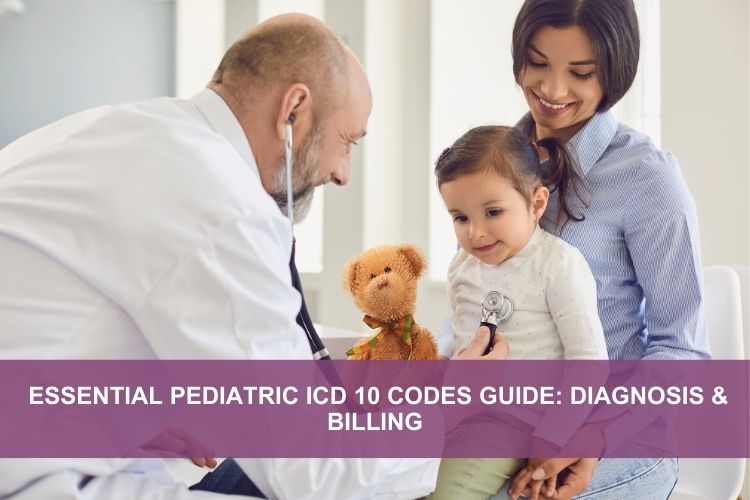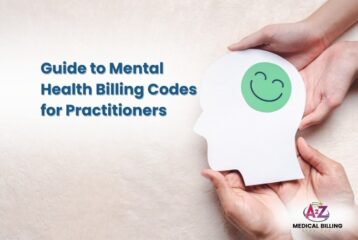Pediatric ICD-10 codes are crucial for healthcare providers to understand accurately when diagnosing and documenting, particularly with children’s medical concerns. These codes are more helpful to ensure precise billing and timely reimbursements.
Specific ICD-10 codes cover a range of conditions, from respiratory issues in childhood asthma to developmental delays. Each code is linked to a relevant diagnosis, therefore using these codes accurately is important for patient care. These ICD-10 codes also help streamline and reduce claim denials.
Through this document you will get a concise guideline on key ICD-10 updates for common pediatric codes, highlighting important changes in pediatric care covering mental health, eye disorders, respiratory conditions, symptoms, and many other factors affecting health issues.
Common Pediatric ICD 10 Codes
Identifying and using accurate pediatric ICD-10 codes are crucial for correct diagnosis, documentation, and billing in pediatric healthcare. This section will highlight the key codes used in pediatric practice to enhance patient record accuracy and streamline billing processes.
Key Diagnosis Codes in Pediatric Care
Pediatric ICD 10 code a range of conditions typically appear in children, from common infections to routine health assessments. Some of the important codes include:
- ICD-10 Code for a fussy child: R68.12
- Pediatric failure to thrive: R62.51
- ICD-10 code for fever in pediatric patients: R50.9
Codes for Pediatric Asthma and Allergy Conditions
Asthma and allergies frequently affect children, therefore applying the correct ICD 10 codes for these conditions is important. These codes include:
- Childhood asthma ICD 10: J45.909 (unspecified asthma, uncomplicated)
- ICD 10 code for roseola: B08.2
- ICD 10 code for allergic rhinitis: J30.9
Essential Pediatric ICD 10 Codes for Common Conditions
Pediatric ICD 10 code are usually used to diagnose common conditions in children. These codes help to clear documentation and help streamline the billing process to ensure efficient reimbursement and quality patient care.
| Condition | ICD-10 Code | Description |
| Pediatric Failure to Thrive | R62.51 | This code is used for children with inadequate growth or inability to maintain normal growth rates. This code helps monitor treatment effectiveness and ensures accurate reimbursement for the care provided. |
| Fussy Child | R68.12 | This code applies to cases involving a fussy or irritable child. Correct usage aids in managing the symptoms and ensures that related healthcare services are properly billed. |
| Neonatal and Infant Conditions | GERD: K21.9, Fever: R50.9 | GERD in newborns can impact feeding and growth, while accurate coding of fever assists in identifying possible infections or other health concerns. |
Pediatric ICD 10 Codes for Growth and Developmental Challenges
Key pediatric ICD 10 code related to growth and developmental challenges play an important role in these conditions, enabling precise treatment, and facilitating effective reimbursement.
| Condition | ICD-10 Code | Description |
| Developmental Delays | R62.0 | This code is used for recording developmental delays in children, including delays in motor skills and speech. |
| Short Stature in Pediatrics | R62.52 | This code is for short stature in children due to causes like growth hormone deficiency or genetic factors. |
Gastrointestinal and Respiratory Pediatric ICD 10 Codes
Common gastrointestinal and respiratory conditions in pediatrics codes help for accurate coding to ensure appropriate treatment and smooth reimbursement processes for these conditions.
| Condition | ICD-10 Code | Description |
| Heart Murmur in Newborn | R01.1 | This code is used to document heart murmurs in newborns, which are abnormal sounds heard during a heartbeat. |
| Constipation in Newborn | K59.00 | It helps with constipation in newborns. |
Key ICD 10 Codes for Common Pediatric Conditions
Common pediatric practices, including those for viral infections and skin condition codes, are crucial for effective documentation, patient management, and proper reimbursement.
Codes for Viral Infections and Skin Conditions
Viral infections and skin conditions are common affective conditions in pediatric practice, requiring precise ICD 10 codes for accurate documentation and treatment. For example:
| Condition | ICD-10 Code | Description |
| Roseola | B08.2 | Used for documenting roseola, a common viral infection in young children. |
| Eczema | L20-L30 | It covers various types of eczema, such as atopic dermatitis, in pediatric patients. |
| Molluscum Contagiosum | B08.1 | For cases of molluscum contagiosum, a viral skin infection is seen in children. |
| Viral Warts | B07 | This code is used in coding viral warts, including plantar and common warts, frequently observed in children. |
| Hand, Foot, and Mouth Disease | B08.4 | It applies in cases of hand, foot, and mouth disease, a viral condition affecting young children. |
Conclusion
Essential accurate diagnosis, effective treatment, and efficient reimbursement in healthcare especially in precise pediatric ICD-10 coding. Proper accurate coding for such conditions may be failure to thrive, developmental delays, and pediatric infections ensures smooth documentation. This supports high-quality patient care. Thoroughly up-to-date with these codes enables health providers to provide better care and maintain operational efficiency. Understanding these key pediatric ICD-10 codes is important for successful healthcare reimbursement in pediatrics.
FAQs
What are pediatric ICD-10 codes, and why are they important?
Pediatric ICD-10 codes are standardized for diagnosing and documenting children’s medical conditions. They are essential for accurate billing, timely reimbursements, and ensuring high-quality patient care.
How do pediatric ICD-10 codes improve patient care?
Correct use of these codes ensures precise diagnosis and treatment, reduces the risk of claim denials, and enhances overall care by supporting clear and accurate medical documentation.
Which common conditions are covered by pediatric ICD-10 codes?
Common conditions include childhood asthma, developmental delays, failure to thrive, heart murmurs in newborns, and various viral infections and skin conditions.
Why is accurate ICD-10 coding critical for healthcare providers?
Accurate coding is vital for proper diagnosis, treatment planning, and reimbursement processes, directly impacting the operational efficiency of healthcare practices and the quality of care provided to patients.
How can healthcare providers stay updated on pediatric ICD-10 codes?
Providers can stay current by regularly reviewing coding updates, attending relevant training sessions, and consulting reliable resources like this guide for the latest information on pediatric ICD-10 codes.



